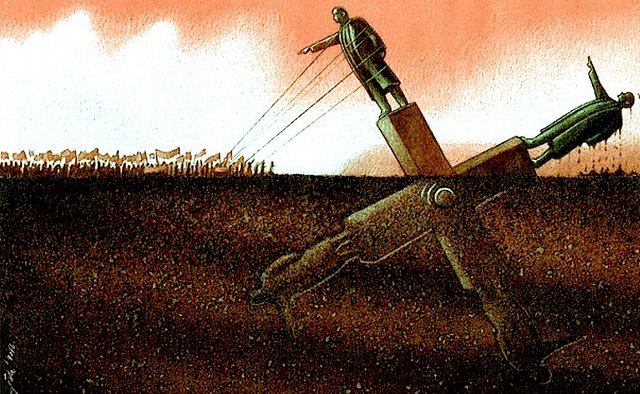
The fundamental flaw in non-anarchistic libertarian thought—that is, that government is necessary, if for nothing other than protection of its citizens (defense from attack from abroad, policing, law enforcement, dispute adjudication, etc.)—is rooted in the lack of recognition that history has readily proven that government can not—will not—be limited by law, especially (and one would think obviously) when the government is the sole author, interpreter, and enforcer of the law.
The dismal failure of the “American Experiment” proved this, once and for all.
So the issue isn’t that there aren’t seemingly legitimate functions of government; it’s that the institution of government has proven, time and time again, that it is impossible to control—especially when it holds a monopoly on authority over the populace and the use of force, and is not subject to market forces.
America’s constitutionally-limited, representative republic failed for precisely the same reason that other political systems such as Socialism and Communism always fail: they all neglect to account for human nature, which dictates that individuals will generally act in their own best interest—including those individuals which comprise the institution of government—which ultimately translates to the government acting in the best interest of the government.
Once one accepts this reality, and thus realizes that government is impossible to control, to limit, in any effective manner, then the only conclusion to be drawn is that it is the very idea of government which is flawed—not necessarily the various structures and/or principles under which it has been manifested throughout history.
True liberty, natural liberty, simply cannot manifest under a monopolized coercive government—regardless of how it is structured.
This fact necessitates the trial of something new, something better, a more effective, non-violent means of creating free, peaceful, and prosperous societies, and casting of the idea of government—even a constitutionally-limited government—onto the scrap heap of history.
“Yeah, we tried that, in every way we could think of…it doesn’t work.”
And further, let’s consider the hundreds of millions of their own citizens that governments murdered (estimates I’ve seen online vary between 170 million and 230 million, so let’s ballpark it at around 200 million) in the 20th century alone (and mind you, this refers to their own citizens—it doesn’t include the millions killed as a result of governments waging war with one another). So 200 million citizens, killed by their own governments, in a single century—and, even more shockingly—a century which supposedly represents major achievement and advancement for humanity and civil society!
But I, for one, cannot consider that horrific number, shrug my shoulders, and say:
“Sorry, but that’s the best we can do.”
I don’t happen to believe that it is the best we can do; I believe we can do much, much better. How? By ending the institution of government, and transferring the government’s “legitimate” functions to private enterprise, operating within a free and open marketplace.
Then, we can sit back, and see what happens. I’m sure we’ll all be amazed!
And what’s more: I think it’s time we turn the tables, transfer the burden of proof back onto those who insist upon the necessity of government, even limited government; so from now on, whenever they ask how a stateless society could ever work—how we would implement it, how we get from here to there, how this issue or that issue would be handled without the state—rather than trying to answer, trying to posit potential solutions or speculate upon future scenarios, we should instead respond with a simple question:
“Instead of asking me how a stateless society would work, how about you tell me how you plan to limit the state?”
The silence will be deafening.
Hi! I am a content-detection robot. This post is to help manual curators; I have NOT flagged you.
Here is similar content:
http://randeastwood.com/2015/12/26/the-fundamental-flaw-in-non-anarchistic-libertarian-thought/
Downvoting a post can decrease pending rewards and make it less visible. Common reasons:
Submit
I can vouch he is the original creator of this content.
Downvoting a post can decrease pending rewards and make it less visible. Common reasons:
Submit
I didn't know you were on here as well!
Downvoting a post can decrease pending rewards and make it less visible. Common reasons:
Submit
Same here.
Downvoting a post can decrease pending rewards and make it less visible. Common reasons:
Submit
That image alone is worth an upvote, but the article is fantastic as well.
Good job!
Downvoting a post can decrease pending rewards and make it less visible. Common reasons:
Submit
Rand, it's a pleasure to see you join some of us here on Steemit. And, as I have come to expect from you, an excellent post! :D Looking forward to more from you in the future, and I hope we can both find a way to make this a more permanent fixture in our lives, and not just something we do for fun.
Downvoting a post can decrease pending rewards and make it less visible. Common reasons:
Submit
just up voted it :) Cheers!
Downvoting a post can decrease pending rewards and make it less visible. Common reasons:
Submit
-markie
Downvoting a post can decrease pending rewards and make it less visible. Common reasons:
Submit